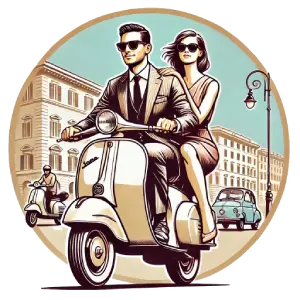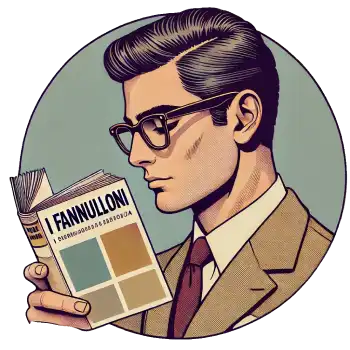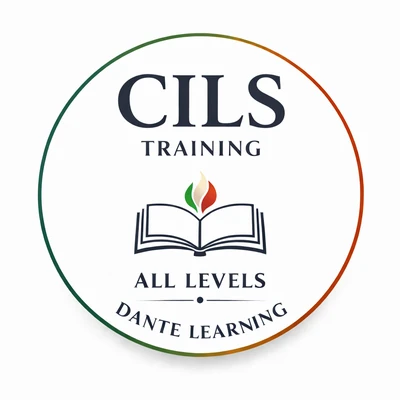Complete Guide to Italian Body Parts: Master Parti del Corpo Vocabulary and Pronunciation
Learning Italian body parts vocabulary is essential for everyday conversations, medical situations, and describing people. Even intermediate Italian speakers often struggle with body parts pronunciation and irregular plurals. This comprehensive guide covers all essential parti del corpo with audio pronunciation, grammar rules, and practical examples you’ll actually use.
Ready to master Italian anatomy vocabulary like Leonardo da Vinci studied the human body?
La Testa – Italian Head Parts Vocabulary
The head contains some of the most commonly used Italian body parts. Pay special attention to the pronunciation and gender of each word – this vocabulary appears frequently in everyday Italian conversations.
- i capelli – hair
Ha i capelli castani molto lunghi.
She has very long brown hair. - la fronte – forehead
Ha la fronte alta e spaziosa.
He has a high and spacious forehead. - il sopracciglio – eyebrow
Il sopracciglio sinistro è più sottile del destro.
The left eyebrow is thinner than the right one. - l’occhio – eye
Il suo occhio destro è di un verde intenso.
Her right eye is an intense green. - le ciglia – eyelashes
Le ciglia lunghe e folte incorniciano i suoi occhi.
The long and thick eyelashes frame her eyes. - il naso – nose
Il naso aquilino gli dà un aspetto distinto.
The aquiline nose gives him a distinguished appearance. - la guancia – cheek
La bambina ha una guancia sporca di cioccolato.
The little girl has a cheek dirty with chocolate. - la bocca – mouth
Non aprire la bocca mentre mangi!
Don’t open your mouth while eating! - le labbra – lips
Le labbra rosse contrastano con la pelle chiara.
The red lips contrast with the fair skin. - i denti – teeth
I denti bianchi e dritti sono il risultato dell’apparecchio.
The white and straight teeth are the result of braces. - la lingua – tongue
Mi sono morso la lingua mangiando troppo velocemente.
I bit my tongue eating too quickly. - il mento – chin
Il mento sporgente è una caratteristica di famiglia.
The prominent chin is a family trait. - l’orecchio – ear
L’orecchio destro mi fa male da stamattina.
My right ear has been hurting since this morning. - il collo – neck
Il collo lungo la fa sembrare molto elegante.
The long neck makes her look very elegant.
Grammar Note: Unlike English, i capelli (hair) is countable in Italian. A single hair is il capello. Notice how il sopracciglio (eyebrow) becomes le sopracciglia in the plural – this follows a special pattern we’ll explain below.
Common Italian Phrases with Head Parts
- “Ha i capelli biondi” – He/she has blonde hair
- “Gli occhi azzurri” – Blue eyes
- “Un naso aquilino” – An aquiline nose
- “Le labbra rosse” – Red lips
Example Sentences – Head Parts
- “Mia sorella ha i capelli ricci e gli occhi verdi.”
My sister has curly hair and green eyes. - “Il bambino si è sporcato la faccia con il gelato.”
The child got his face dirty with ice cream. - “Devo lavarmi i denti prima di andare a letto.”
I need to brush my teeth before going to bed. - “Ha le sopracciglia molto folte e scure.”
He has very thick and dark eyebrows. - “Non riesco a sentire bene con questo orecchio.”
I can’t hear well with this ear.
Il Torso – Italian Torso and Body Parts
The torso includes essential Italian body vocabulary for describing the main body. These words are crucial for clothing descriptions, medical conversations, and general body-related discussions in Italian.
- la spalla – shoulder
Mi fa male la spalla dopo l’allenamento in palestra.
My shoulder hurts after the gym workout. - il petto – chest
Il nuotatore ha il petto muscoloso e sviluppato.
The swimmer has a muscular and developed chest. - il seno – breast
La camicia è troppo stretta al seno.
The shirt is too tight around the breast. - la schiena – back
Ho la schiena rigida dopo aver dormito male.
My back is stiff after sleeping badly. - la pancia – belly
Dopo la cena la pancia è troppo piena.
After dinner the belly is too full. - lo stomaco – stomach
Lo stomaco vuoto brontola rumorosamente.
The empty stomach rumbles loudly. - l’ombelico – navel/belly button
Il piercing all’ombelico è molto di moda.
The belly button piercing is very fashionable. - la vita – waist
La cintura stringe troppo la vita.
The belt squeezes the waist too much. - i fianchi – hips
I fianchi larghi sono tipici della figura femminile.
Wide hips are typical of the female figure. - il sedere – bottom/buttocks
Il bambino è caduto sul sedere nel parco.
The child fell on his bottom in the park. - la costola – rib
Si è rotta una costola cadendo dalla scala.
She broke a rib falling from the ladder.
Vocabulary Note: Il seno typically refers to both breasts collectively. The informal word for buttocks is il culo, though il sedere is more polite in formal situations.
Essential Torso-Related Italian Expressions
- “Spalle larghe” – Broad shoulders
- “Mal di schiena” – Back pain
- “Pancia piena” – Full belly
- “Vita stretta” – Narrow waist
Example Sentences – Torso
- “Il nuotatore ha spalle molto larghe e muscoli del petto sviluppati.”
The swimmer has very broad shoulders and developed chest muscles. - “Dopo la cena abbondante, ho la pancia troppo piena.”
After the big dinner, my belly is too full. - “Ho dormito male e ora mi fa male tutta la schiena.”
I slept badly and now my whole back hurts. - “Il vestito le sta perfetto perché ha la vita sottile.”
The dress fits her perfectly because she has a slim waist. - “Il bambino si è fatto male cadendo sul sedere.”
The child hurt himself falling on his bottom.
Gli Arti – Italian Arms and Legs Vocabulary
Arms and legs vocabulary in Italian includes some tricky irregular plurals and important pronunciation points. Master these Italian limb parts for complete body vocabulary fluency.
- l’ascella – armpit
L’ascella destra è irritata dopo la rasatura.
The right armpit is irritated after shaving. - il braccio – arm
Il braccio sinistro è più forte del destro.
The left arm is stronger than the right one. - il gomito – elbow
Mi sono sbucciato il gomito cadendo in bicicletta.
I scraped my elbow falling off my bike. - l’avambraccio – forearm
L’avambraccio è coperto di tatuaggi colorati.
The forearm is covered with colorful tattoos. - il polso – wrist
Il polso mi fa male dopo aver scritto tutto il giorno.
My wrist hurts after writing all day. - la mano – hand
La mano destra è più abile della sinistra.
The right hand is more skilled than the left. - il palmo – palm
Il palmo della mano è sudato per la tensione.
The palm of the hand is sweaty from tension. - il dito – finger
Il dito anulare porta l’anello di matrimonio.
The ring finger wears the wedding ring. - le unghie – nails
Le unghie rosse sono perfettamente curate.
The red nails are perfectly manicured. - le nocche – knuckles
Le nocche sono sbucciate dopo la rissa.
The knuckles are scraped after the fight. - la coscia – thigh
La coscia sinistra è dolorante dopo la corsa.
The left thigh is sore after running. - il ginocchio – knee
Il ginocchio destro scricchiola quando lo piego.
The right knee creaks when I bend it. - la gamba – leg
La gamba destra è più lunga della sinistra.
The right leg is longer than the left. - il polpaccio – calf
Il polpaccio si è indurito dopo l’allenamento.
The calf got hard after the workout. - lo stinco – shin
Lo stinco è livido dopo il calcio ricevuto.
The shin is bruised after the kick received. - la caviglia – ankle
La caviglia si è gonfiata dopo la storta.
The ankle swelled after the sprain. - il piede – foot
Il piede destro è più grande del sinistro.
The right foot is bigger than the left. - la pianta del piede – sole
La pianta del piede è molto sensibile al solletico.
The sole of the foot is very sensitive to tickling. - il tallone – heel
Il tallone è screpolato per la pelle secca.
The heel is cracked due to dry skin.
Italian Finger Names – I Nomi delle Dita
The Italian finger names from thumb to pinky are essential vocabulary:
- il pollice – thumb
- l’indice – index finger
- il medio – middle finger
- l’anulare – ring finger
- il mignolo – pinky finger
Example Sentences – Arms and Legs
- “Mi sono rotto il braccio sinistro cadendo dalla bicicletta.”
I broke my left arm falling from the bicycle. - “Il giocatore di calcio ha le gambe molto muscolose.”
The soccer player has very muscular legs. - “Non riesco a piegare il ginocchio dopo l’incidente.”
I can’t bend my knee after the accident. - “Ha le mani delicate con le unghie sempre perfette.”
She has delicate hands with always perfect nails. - “Dopo la lunga camminata, mi fanno male i piedi e le caviglie.”
After the long walk, my feet and ankles hurt. - “Il pianista ha dita lunghe e affusolate.”
The pianist has long and tapered fingers.
Italian Body Parts with Irregular Plurals
Several Italian body parts have irregular plurals that change from masculine singular to feminine plural. This grammar rule comes from Latin neuter nouns and is essential for correct Italian usage.
| Singular (Masculine) | Plural (Feminine) | English |
|---|---|---|
| il sopracciglio | le sopracciglia | eyebrow/eyebrows |
| il ciglio | le ciglia | eyelash/eyelashes |
| il braccio | le braccia | arm/arms |
| il ginocchio | le ginocchia | knee/knees |
| il labbro | le labbra | lip/lips |
| il dito | le dita | finger/fingers |
Memory Tip: Remember the pattern LE + word ending in -A for these irregular plurals. For example: LE DITA, LE BRACCIA, LE GINOCCHIA.
Example Sentences – Irregular Plurals
- “Le sue sopracciglia sono perfettamente curate.”
Her eyebrows are perfectly groomed. - “Il ballerino ha le braccia lunghe ed eleganti.”
The dancer has long and elegant arms. - “Dopo la corsa, mi fanno male le ginocchia.”
After running, my knees hurt. - “Ha le labbra naturalmente rosse e carnose.”
She has naturally red and full lips. - “Il chitarrista ha le dita molto agili e veloci.”
The guitarist has very agile and fast fingers.
How to Express Pain in Italian – Esprimere Dolore
Knowing how to express pain in Italian is crucial for medical situations and everyday complaints. The construction changes based on singular or plural body parts.
Italian Pain Expressions Formula
- Mi fa male + singular body part
- Mi fanno male + plural body parts
Common Italian Pain Expressions
- “Mi fa male la testa” – My head hurts / I have a headache
- “Mi fa male lo stomaco” – My stomach hurts
- “Mi fa male la schiena” – My back hurts
- “Mi fanno male le gambe” – My legs hurt
- “Mi fanno male i piedi” – My feet hurt
- “Mi fanno male le braccia” – My arms hurt
Alternative Pain Expressions in Italian
- “Ho mal di testa” – I have a headache
- “Ho mal di pancia” – I have a stomachache
- “Ho mal di schiena” – I have back pain
- “Sento dolore al ginocchio” – I feel pain in my knee
Italian Body Parts Pronunciation Tips
Mastering Italian body parts pronunciation requires attention to stress patterns and vowel sounds. Here are key pronunciation tips for common mistakes:
- Occhio – Double ‘c’ creates a ‘k’ sound
- Orecchio – Stress on the second syllable
- Ginocchio – ‘Gn’ makes a ‘ny’ sound
- Sopracciglia – Double ‘c’ + ‘i’ = ‘ch’ sound
- Caviglia – ‘Gli’ makes a ‘ly’ sound
Advanced Italian Body Vocabulary
For advanced Italian learners, here are additional body-related terms that appear in medical contexts and literature:
la nuca – nape of neck
La nuca è esposta al sole senza cappello.
The nape is exposed to the sun without a hat.
la tempia – temple
La tempia pulsa quando sono stressato.
The temple throbs when I’m stressed.
la mascella – jaw
La mascella è contratta per la tensione.
The jaw is clenched from tension.
la clavicola – collarbone
La clavicola è visibile sotto la pelle sottile.
The collarbone is visible under the thin skin.
la scapola – shoulder blade
La scapola sinistra è più sporgente della destra.
The left shoulder blade is more prominent than the right.
il polmone – lung
Il polmone destro è più grande del sinistro.
The right lung is bigger than the left.
il cuore – heart
Il cuore batte forte dopo la corsa.
The heart beats fast after running.
il fegato – liver
Il fegato è l’organo che filtra le tossine.
The liver is the organ that filters toxins.
i reni – kidneys
I reni producono l’urina filtrando il sangue.
The kidneys produce urine by filtering blood.
la milza – spleen
La milza è un organo poco conosciuto ma importante.
The spleen is a little-known but important organ.
Italian Idioms with Body Parts
Italian uses many body part idioms in everyday speech. Learning these expressions will make your Italian sound more natural:
“Costare un occhio della testa” – To cost an arm and a leg (literally: cost an eye of the head)
Quella macchina sportiva costa un occhio della testa!
That sports car costs an arm and a leg!
“Avere le mani bucate” – To be a spendthrift (literally: to have holes in your hands)
Marco ha sempre le mani bucate, spende tutto quello che guadagna.
Marco is always a spendthrift, he spends everything he earns.
“Essere in gamba” – To be smart/capable (literally: to be in leg)
Mia sorella è davvero in gamba, risolve tutti i problemi da sola.
My sister is really capable, she solves all problems by herself.
“Perdere la testa” – To lose one’s mind (literally: to lose the head)
Non perdere la testa per quella ragazza, non ne vale la pena!
Don’t lose your mind over that girl, she’s not worth it!
“Avere buon naso” – To have good intuition (literally: to have a good nose)
Il detective ha buon naso per i casi complicati.
The detective has good intuition for complicated cases.
“Metterci una mano sul fuoco” – To be absolutely certain (literally: to put a hand on fire)
Che lui sia innocente? Ci metto una mano sul fuoco!
That he’s innocent? I’d bet my life on it!
“Avere la testa fra le nuvole” – To be absent-minded (literally: to have the head in the clouds)
Lucia ha sempre la testa fra le nuvole quando studia.
Lucia always has her head in the clouds when studying.
“Dare una mano” – To lend a hand/help (literally: to give a hand)
Puoi darmi una mano a spostare questo tavolo?
Can you lend me a hand moving this table?
“Alzare un dito” – To lift a finger/make an effort (literally: to raise a finger)
Non ha mai alzato un dito per aiutare in casa.
He never lifted a finger to help around the house.
“Toccare con mano” – To experience firsthand (literally: to touch with hand)
Ho toccato con mano la sua generosità durante la crisi.
I experienced his generosity firsthand during the crisis.
Summary: Mastering Italian Body Parts Vocabulary
Learning Italian body parts vocabulary opens doors to natural conversations about health, appearance, and daily life. Remember these key points:
- Pay attention to irregular plurals (braccio → braccia, dito → dita)
- Practice the pain expressions “mi fa male” vs “mi fanno male”
- Focus on correct pronunciation of double consonants
- Learn common body part idioms for natural speech
- Use the audio files to perfect your pronunciation
Continue practicing with our interactive quiz above and bookmark this guide for reference. Mastering parti del corpo vocabulary is essential for intermediate and advanced Italian fluency!
Free Quiz
Dante-Learning
Start Your Italian Language Journey Now

Login or subscribe with one click and keep studying this lesson for free.
Try the Quiz
Buona Fortuna!





